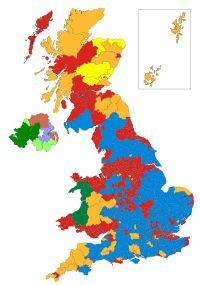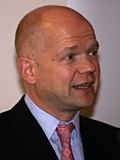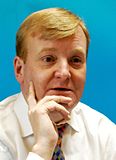
Back Eleccions al Parlament del Regne Unit de 2001 Catalan Etholiad cyffredinol y Deyrnas Unedig, 2001 Welsh Parlamentsvalget i Storbritannien 2001 Danish Britische Unterhauswahl 2001 German Elecciones generales del Reino Unido de 2001 Spanish Yhdistyneen kuningaskunnan parlamenttivaalit 2001 Finnish Élections générales britanniques de 2001 French הבחירות הכלליות בבריטניה 2001 HE Elezioni generali nel Regno Unito del 2001 Italian 2001年イギリス総選挙 Japanese
| |||||||||||||||||||||||||||||||||||||||||||||
All 659 seats to the House of Commons 330 seats needed for a majority | |||||||||||||||||||||||||||||||||||||||||||||
|---|---|---|---|---|---|---|---|---|---|---|---|---|---|---|---|---|---|---|---|---|---|---|---|---|---|---|---|---|---|---|---|---|---|---|---|---|---|---|---|---|---|---|---|---|---|
| Opinion polls | |||||||||||||||||||||||||||||||||||||||||||||
| Registered | 44,403,238 | ||||||||||||||||||||||||||||||||||||||||||||
| Turnout | 59.4% ( | ||||||||||||||||||||||||||||||||||||||||||||
| |||||||||||||||||||||||||||||||||||||||||||||
 Colours denote the winning party, as shown in the main table of results. | |||||||||||||||||||||||||||||||||||||||||||||
 Composition of the House of Commons after the election | |||||||||||||||||||||||||||||||||||||||||||||
| |||||||||||||||||||||||||||||||||||||||||||||

The 2001 United Kingdom general election was held on Thursday 7 June 2001, four years after the previous election on 1 May 1997, to elect 659 members to the House of Commons. The governing Labour Party was re-elected to serve a second term in government with another landslide victory with a 167 majority, returning 412 members of Parliament versus 418 from the 1997 general election, a net loss of six seats, though with a significantly lower turnout than before—59.4%, compared to 71.6% at the previous election.[1] The number of votes Labour received fell by nearly three million. Tony Blair went on to become the only Labour Prime Minister to serve two consecutive full terms in office. As Labour retained almost all of their seats won in the 1997 landslide victory, the media dubbed the 2001 election "the quiet landslide".[2]
There was little change outside Northern Ireland, with 620 out of the 641 seats in Great Britain electing candidates from the same party as they did in 1997. Factors contributing to the Labour victory included a strong economy, falling unemployment, and public perception that the Labour government had delivered on many key election pledges that it had made in 1997.[citation needed]
The opposition Conservative Party, under William Hague's leadership, was still deeply divided on the issue of Europe and the party's policy platform had drifted considerably to the right. The party put the issue of European monetary union (and in particular, the prospect of the UK joining the Eurozone) at the centre of its campaign, but it failed to resonate with the electorate. The Tories briefly had a narrow lead in the polls during the 2000 fuel strikes, but Labour successfully resolved them by year end. Furthermore, a series of publicity stunts that backfired also harmed Hague, and he immediately announced his resignation as party leader when the election result was clear, formally stepping down three months later, therefore becoming the first leader of the Conservative and Unionist Party in the House of Commons since Austen Chamberlain nearly eighty years prior not to serve as prime minister.
The election was largely a repeat of the 1997 general election, with Labour losing only six seats overall and the Conservatives making a net gain of one seat (gaining nine seats but losing eight). The Conservatives gained a seat in Scotland, which ended the party's status as an "England-only" party in the prior parliament, but failed again to win any seats in Wales. Although they did not gain many seats, three of the few new MPs elected were future Conservative Prime Ministers David Cameron and Boris Johnson and future Conservative Chancellor of the Exchequer George Osborne; Osborne would serve in the same Cabinet as Cameron from 2010 to 2016. The Liberal Democrats made a net gain of six seats.
The 2001 general election is the last to date in which any government has held an overall majority of more than 100 seats in the House of Commons, and the second of only two since the Second World War (the other being 1997) in which a single party won over 400 MPs. Notable departing MPs included former Prime Ministers Edward Heath (also Father of the House) and John Major, former Deputy Prime Minister Michael Heseltine, former Liberal Democrat leader Paddy Ashdown, former Cabinet ministers Tony Benn, Tom King, John Morris, Mo Mowlam, John MacGregor and Peter Brooke, Teresa Gorman, and then Mayor of London Ken Livingstone.
Change was seen in Northern Ireland, with the moderate unionist Ulster Unionist Party (UUP) losing four seats to the more hardline Democratic Unionist Party (DUP). A similar transition appeared in the nationalist community, with the moderate Social Democratic and Labour Party (SDLP) losing votes to the more staunchly republican and abstentionist Sinn Féin.
Exceptionally low voter turnout, which fell below 60% for the first (and so far, only) time since 1918, also marked this election.[3] The election was broadcast live on BBC One and presented by David Dimbleby, Jeremy Paxman, Andrew Marr, Peter Snow, and Tony King.[4]
The 2001 general election was notable for being the first in which pictures of the party logos appeared on the ballot paper. Prior to this, the ballot paper had only displayed the candidate's name, address, and party name.[5]
- ^ "Turnout 'at 80-year low'". BBC. 8 June 2001. Retrieved 7 December 2022.
- ^ Parkinson, Justin (3 August 2010). "The rise and fall of New Labour". BBC News. Retrieved 12 May 2015.
- ^ Audickas, Lukas; Cracknell, Richard (13 December 2018). "UK Election Statistics: 1918–2018: 100 Years of Elections" (PDF). Briefing Paper Number CBP7529. House of Commons Library. p. 25. Archived (PDF) from the original on 9 October 2022. Retrieved 1 April 2019.
- ^ "BBC Vote 2001 Coverage". YouTube. Archived from the original on 23 November 2021.
- ^ Overs, Jeff (1 June 2001). "General Election 2001 postal vote ballot paper voting slip". BBC News & Current Affairs. 466659381. Retrieved 1 April 2019 – via Getty Images.
© MMXXIII Rich X Search. We shall prevail. All rights reserved. Rich X Search


